POL2000, Semester 1: Self-Interest Impact on Society Analysis
VerifiedAdded on 2022/08/24
|6
|1238
|34
Report
AI Summary
This report analyzes the debate surrounding the impact of self-interest on society. It examines the historical context, particularly the shift from feudalism to capitalism, and explores contrasting viewpoints. The report presents a liberal perspective, drawing on Shand's argument that self-interest benefits society through utilitarian principles and market mechanisms. It also critiques this view, citing Pink's concerns about the negative effects of strict work environments on employee motivation and creativity. The report concludes by highlighting the importance of social contract theory in balancing individual interests with the needs of the community.
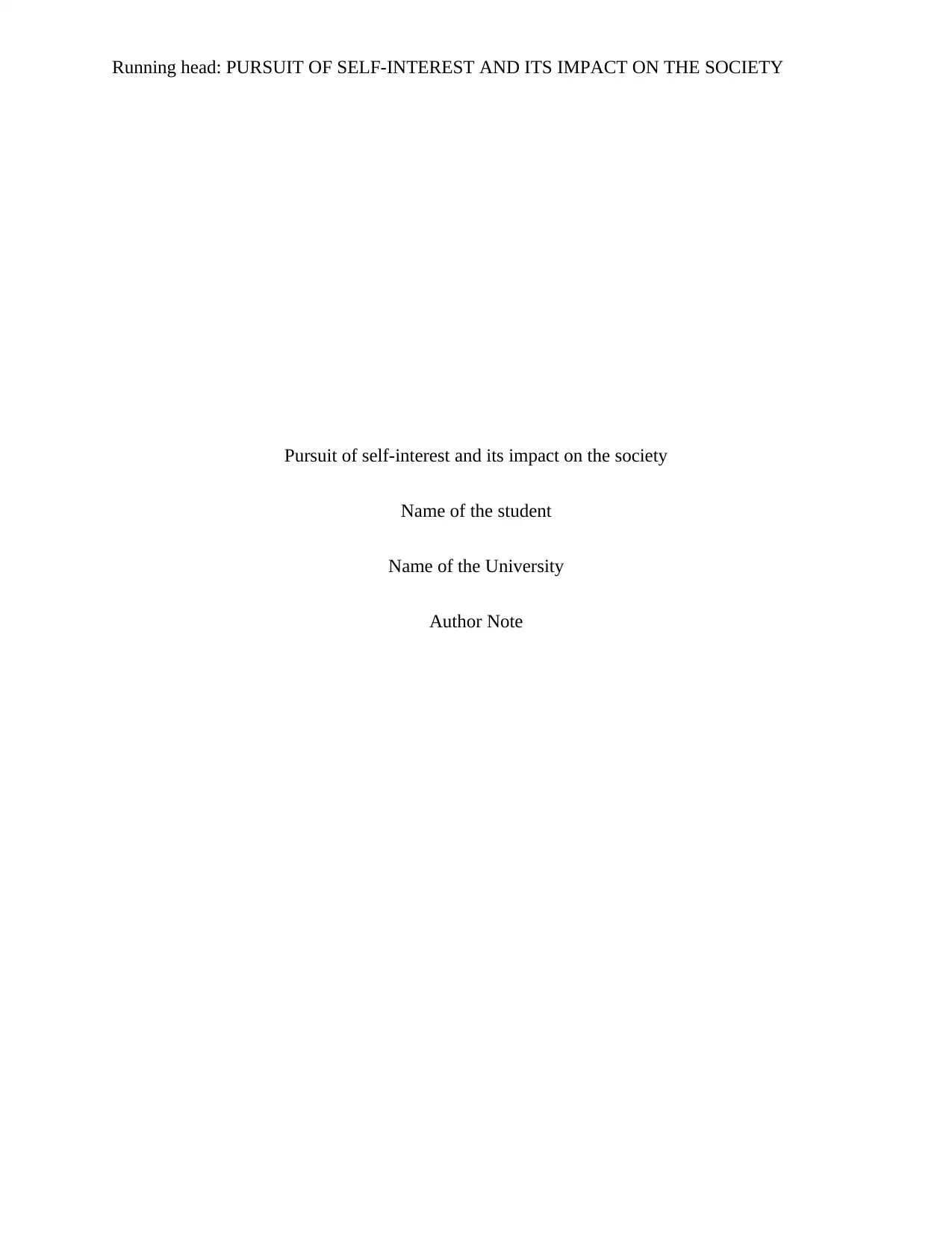
Running head: PURSUIT OF SELF-INTEREST AND ITS IMPACT ON THE SOCIETY
Pursuit of self-interest and its impact on the society
Name of the student
Name of the University
Author Note
Pursuit of self-interest and its impact on the society
Name of the student
Name of the University
Author Note
Paraphrase This Document
Need a fresh take? Get an instant paraphrase of this document with our AI Paraphraser
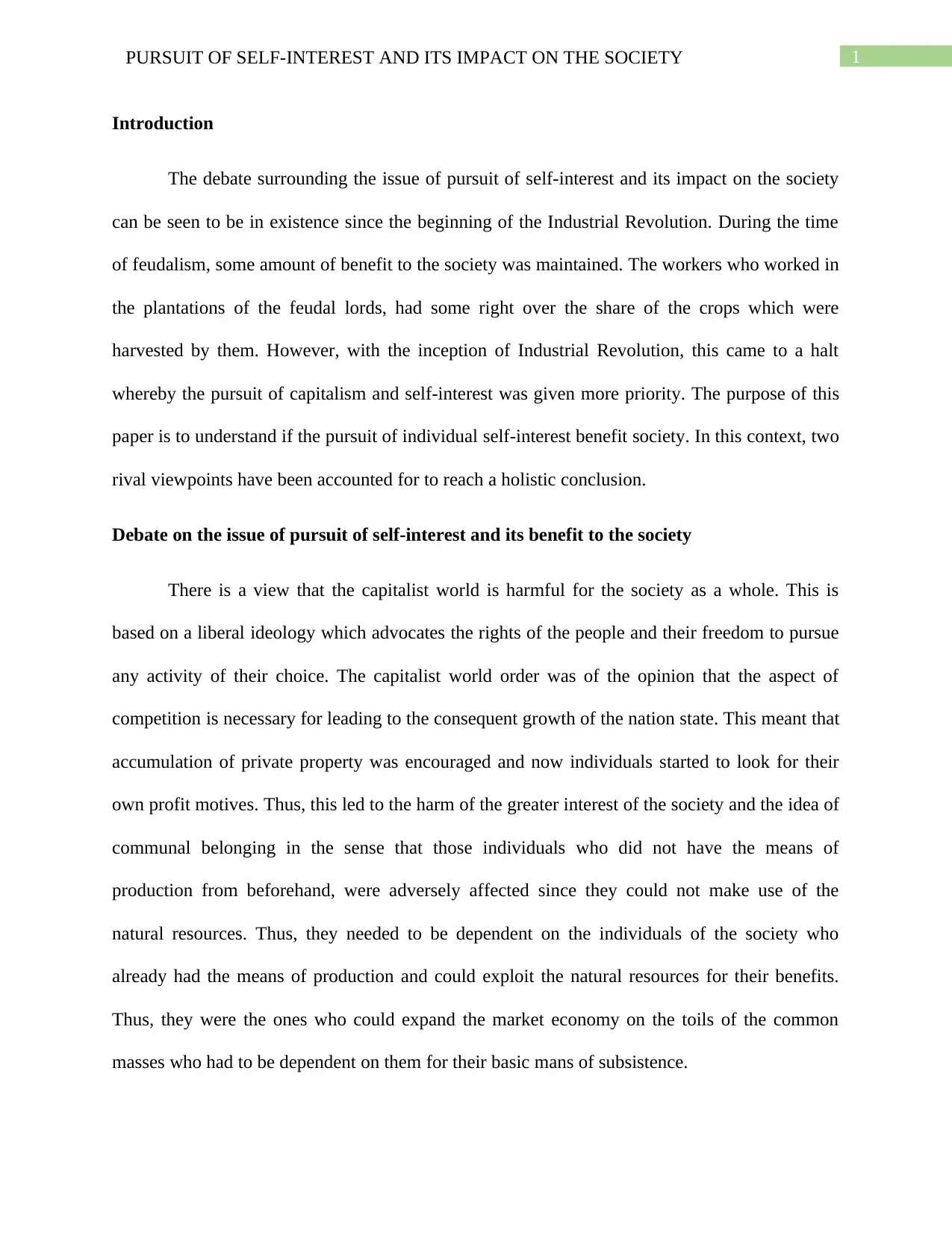
1PURSUIT OF SELF-INTEREST AND ITS IMPACT ON THE SOCIETY
Introduction
The debate surrounding the issue of pursuit of self-interest and its impact on the society
can be seen to be in existence since the beginning of the Industrial Revolution. During the time
of feudalism, some amount of benefit to the society was maintained. The workers who worked in
the plantations of the feudal lords, had some right over the share of the crops which were
harvested by them. However, with the inception of Industrial Revolution, this came to a halt
whereby the pursuit of capitalism and self-interest was given more priority. The purpose of this
paper is to understand if the pursuit of individual self-interest benefit society. In this context, two
rival viewpoints have been accounted for to reach a holistic conclusion.
Debate on the issue of pursuit of self-interest and its benefit to the society
There is a view that the capitalist world is harmful for the society as a whole. This is
based on a liberal ideology which advocates the rights of the people and their freedom to pursue
any activity of their choice. The capitalist world order was of the opinion that the aspect of
competition is necessary for leading to the consequent growth of the nation state. This meant that
accumulation of private property was encouraged and now individuals started to look for their
own profit motives. Thus, this led to the harm of the greater interest of the society and the idea of
communal belonging in the sense that those individuals who did not have the means of
production from beforehand, were adversely affected since they could not make use of the
natural resources. Thus, they needed to be dependent on the individuals of the society who
already had the means of production and could exploit the natural resources for their benefits.
Thus, they were the ones who could expand the market economy on the toils of the common
masses who had to be dependent on them for their basic mans of subsistence.
Introduction
The debate surrounding the issue of pursuit of self-interest and its impact on the society
can be seen to be in existence since the beginning of the Industrial Revolution. During the time
of feudalism, some amount of benefit to the society was maintained. The workers who worked in
the plantations of the feudal lords, had some right over the share of the crops which were
harvested by them. However, with the inception of Industrial Revolution, this came to a halt
whereby the pursuit of capitalism and self-interest was given more priority. The purpose of this
paper is to understand if the pursuit of individual self-interest benefit society. In this context, two
rival viewpoints have been accounted for to reach a holistic conclusion.
Debate on the issue of pursuit of self-interest and its benefit to the society
There is a view that the capitalist world is harmful for the society as a whole. This is
based on a liberal ideology which advocates the rights of the people and their freedom to pursue
any activity of their choice. The capitalist world order was of the opinion that the aspect of
competition is necessary for leading to the consequent growth of the nation state. This meant that
accumulation of private property was encouraged and now individuals started to look for their
own profit motives. Thus, this led to the harm of the greater interest of the society and the idea of
communal belonging in the sense that those individuals who did not have the means of
production from beforehand, were adversely affected since they could not make use of the
natural resources. Thus, they needed to be dependent on the individuals of the society who
already had the means of production and could exploit the natural resources for their benefits.
Thus, they were the ones who could expand the market economy on the toils of the common
masses who had to be dependent on them for their basic mans of subsistence.
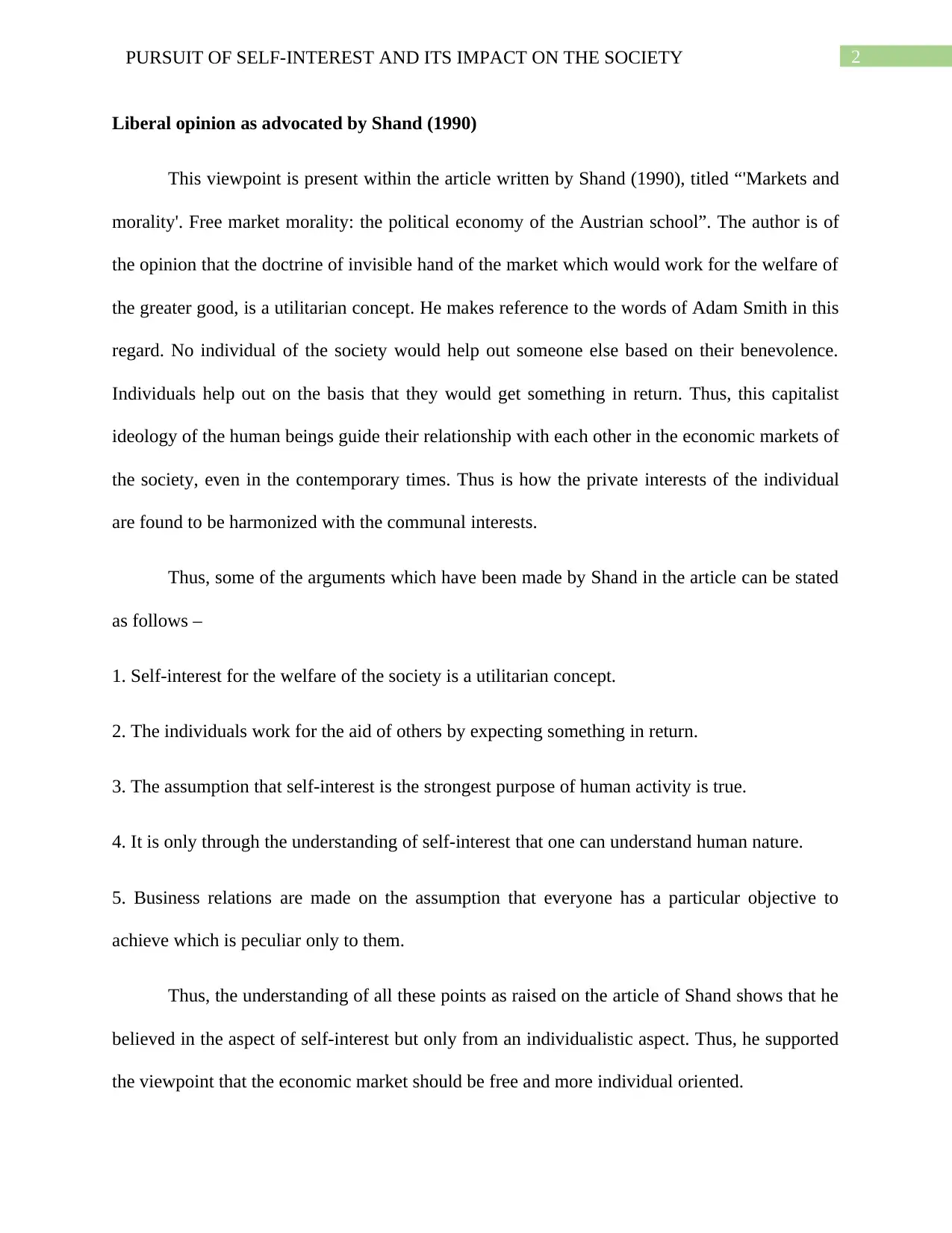
2PURSUIT OF SELF-INTEREST AND ITS IMPACT ON THE SOCIETY
Liberal opinion as advocated by Shand (1990)
This viewpoint is present within the article written by Shand (1990), titled “'Markets and
morality'. Free market morality: the political economy of the Austrian school”. The author is of
the opinion that the doctrine of invisible hand of the market which would work for the welfare of
the greater good, is a utilitarian concept. He makes reference to the words of Adam Smith in this
regard. No individual of the society would help out someone else based on their benevolence.
Individuals help out on the basis that they would get something in return. Thus, this capitalist
ideology of the human beings guide their relationship with each other in the economic markets of
the society, even in the contemporary times. Thus is how the private interests of the individual
are found to be harmonized with the communal interests.
Thus, some of the arguments which have been made by Shand in the article can be stated
as follows –
1. Self-interest for the welfare of the society is a utilitarian concept.
2. The individuals work for the aid of others by expecting something in return.
3. The assumption that self-interest is the strongest purpose of human activity is true.
4. It is only through the understanding of self-interest that one can understand human nature.
5. Business relations are made on the assumption that everyone has a particular objective to
achieve which is peculiar only to them.
Thus, the understanding of all these points as raised on the article of Shand shows that he
believed in the aspect of self-interest but only from an individualistic aspect. Thus, he supported
the viewpoint that the economic market should be free and more individual oriented.
Liberal opinion as advocated by Shand (1990)
This viewpoint is present within the article written by Shand (1990), titled “'Markets and
morality'. Free market morality: the political economy of the Austrian school”. The author is of
the opinion that the doctrine of invisible hand of the market which would work for the welfare of
the greater good, is a utilitarian concept. He makes reference to the words of Adam Smith in this
regard. No individual of the society would help out someone else based on their benevolence.
Individuals help out on the basis that they would get something in return. Thus, this capitalist
ideology of the human beings guide their relationship with each other in the economic markets of
the society, even in the contemporary times. Thus is how the private interests of the individual
are found to be harmonized with the communal interests.
Thus, some of the arguments which have been made by Shand in the article can be stated
as follows –
1. Self-interest for the welfare of the society is a utilitarian concept.
2. The individuals work for the aid of others by expecting something in return.
3. The assumption that self-interest is the strongest purpose of human activity is true.
4. It is only through the understanding of self-interest that one can understand human nature.
5. Business relations are made on the assumption that everyone has a particular objective to
achieve which is peculiar only to them.
Thus, the understanding of all these points as raised on the article of Shand shows that he
believed in the aspect of self-interest but only from an individualistic aspect. Thus, he supported
the viewpoint that the economic market should be free and more individual oriented.
⊘ This is a preview!⊘
Do you want full access?
Subscribe today to unlock all pages.

Trusted by 1+ million students worldwide
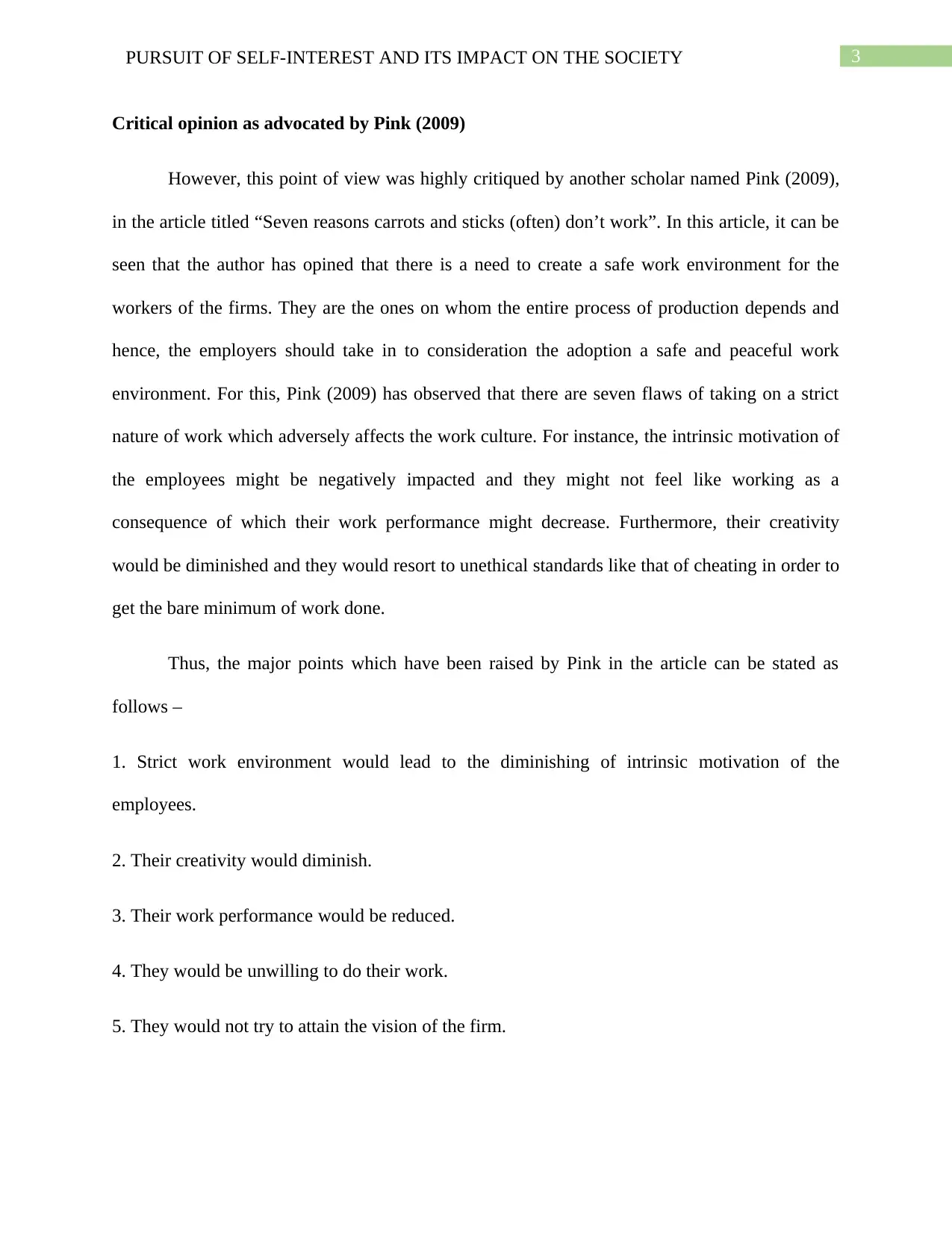
3PURSUIT OF SELF-INTEREST AND ITS IMPACT ON THE SOCIETY
Critical opinion as advocated by Pink (2009)
However, this point of view was highly critiqued by another scholar named Pink (2009),
in the article titled “Seven reasons carrots and sticks (often) don’t work”. In this article, it can be
seen that the author has opined that there is a need to create a safe work environment for the
workers of the firms. They are the ones on whom the entire process of production depends and
hence, the employers should take in to consideration the adoption a safe and peaceful work
environment. For this, Pink (2009) has observed that there are seven flaws of taking on a strict
nature of work which adversely affects the work culture. For instance, the intrinsic motivation of
the employees might be negatively impacted and they might not feel like working as a
consequence of which their work performance might decrease. Furthermore, their creativity
would be diminished and they would resort to unethical standards like that of cheating in order to
get the bare minimum of work done.
Thus, the major points which have been raised by Pink in the article can be stated as
follows –
1. Strict work environment would lead to the diminishing of intrinsic motivation of the
employees.
2. Their creativity would diminish.
3. Their work performance would be reduced.
4. They would be unwilling to do their work.
5. They would not try to attain the vision of the firm.
Critical opinion as advocated by Pink (2009)
However, this point of view was highly critiqued by another scholar named Pink (2009),
in the article titled “Seven reasons carrots and sticks (often) don’t work”. In this article, it can be
seen that the author has opined that there is a need to create a safe work environment for the
workers of the firms. They are the ones on whom the entire process of production depends and
hence, the employers should take in to consideration the adoption a safe and peaceful work
environment. For this, Pink (2009) has observed that there are seven flaws of taking on a strict
nature of work which adversely affects the work culture. For instance, the intrinsic motivation of
the employees might be negatively impacted and they might not feel like working as a
consequence of which their work performance might decrease. Furthermore, their creativity
would be diminished and they would resort to unethical standards like that of cheating in order to
get the bare minimum of work done.
Thus, the major points which have been raised by Pink in the article can be stated as
follows –
1. Strict work environment would lead to the diminishing of intrinsic motivation of the
employees.
2. Their creativity would diminish.
3. Their work performance would be reduced.
4. They would be unwilling to do their work.
5. They would not try to attain the vision of the firm.
Paraphrase This Document
Need a fresh take? Get an instant paraphrase of this document with our AI Paraphraser
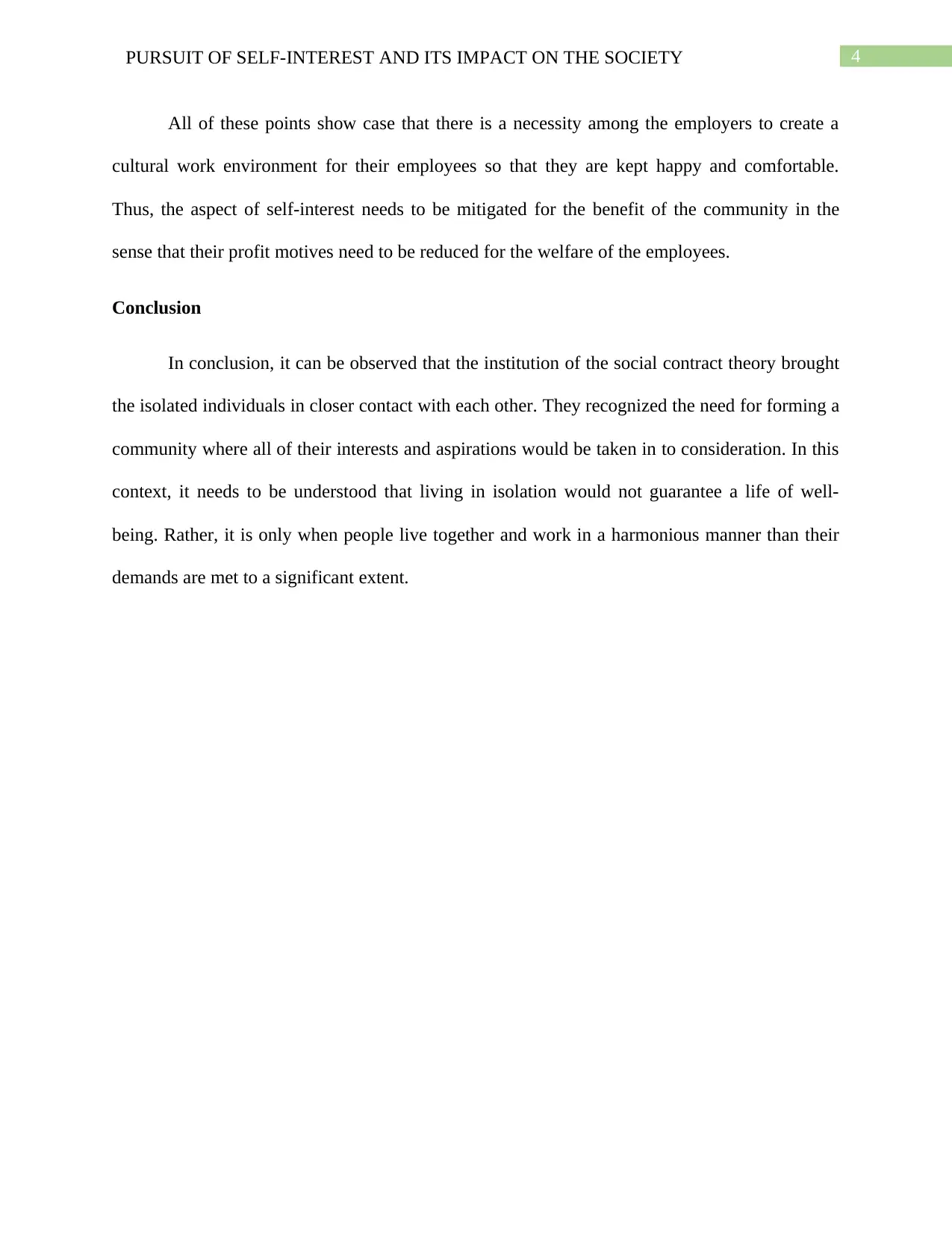
4PURSUIT OF SELF-INTEREST AND ITS IMPACT ON THE SOCIETY
All of these points show case that there is a necessity among the employers to create a
cultural work environment for their employees so that they are kept happy and comfortable.
Thus, the aspect of self-interest needs to be mitigated for the benefit of the community in the
sense that their profit motives need to be reduced for the welfare of the employees.
Conclusion
In conclusion, it can be observed that the institution of the social contract theory brought
the isolated individuals in closer contact with each other. They recognized the need for forming a
community where all of their interests and aspirations would be taken in to consideration. In this
context, it needs to be understood that living in isolation would not guarantee a life of well-
being. Rather, it is only when people live together and work in a harmonious manner than their
demands are met to a significant extent.
All of these points show case that there is a necessity among the employers to create a
cultural work environment for their employees so that they are kept happy and comfortable.
Thus, the aspect of self-interest needs to be mitigated for the benefit of the community in the
sense that their profit motives need to be reduced for the welfare of the employees.
Conclusion
In conclusion, it can be observed that the institution of the social contract theory brought
the isolated individuals in closer contact with each other. They recognized the need for forming a
community where all of their interests and aspirations would be taken in to consideration. In this
context, it needs to be understood that living in isolation would not guarantee a life of well-
being. Rather, it is only when people live together and work in a harmonious manner than their
demands are met to a significant extent.
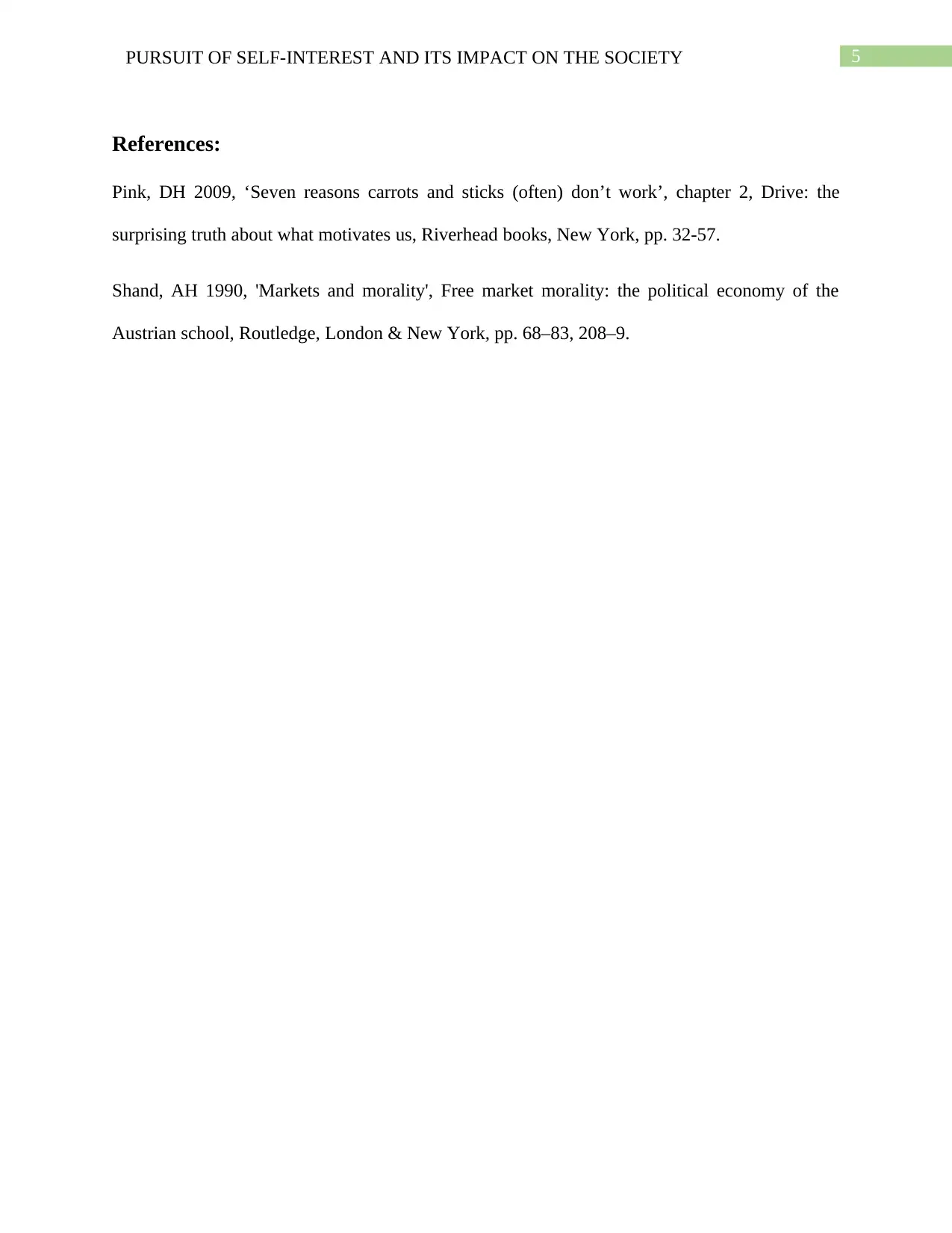
5PURSUIT OF SELF-INTEREST AND ITS IMPACT ON THE SOCIETY
References:
Pink, DH 2009, ‘Seven reasons carrots and sticks (often) don’t work’, chapter 2, Drive: the
surprising truth about what motivates us, Riverhead books, New York, pp. 32-57.
Shand, AH 1990, 'Markets and morality', Free market morality: the political economy of the
Austrian school, Routledge, London & New York, pp. 68–83, 208–9.
References:
Pink, DH 2009, ‘Seven reasons carrots and sticks (often) don’t work’, chapter 2, Drive: the
surprising truth about what motivates us, Riverhead books, New York, pp. 32-57.
Shand, AH 1990, 'Markets and morality', Free market morality: the political economy of the
Austrian school, Routledge, London & New York, pp. 68–83, 208–9.
⊘ This is a preview!⊘
Do you want full access?
Subscribe today to unlock all pages.

Trusted by 1+ million students worldwide
1 out of 6
Your All-in-One AI-Powered Toolkit for Academic Success.
+13062052269
info@desklib.com
Available 24*7 on WhatsApp / Email
![[object Object]](/_next/static/media/star-bottom.7253800d.svg)
Unlock your academic potential
Copyright © 2020–2026 A2Z Services. All Rights Reserved. Developed and managed by ZUCOL.


